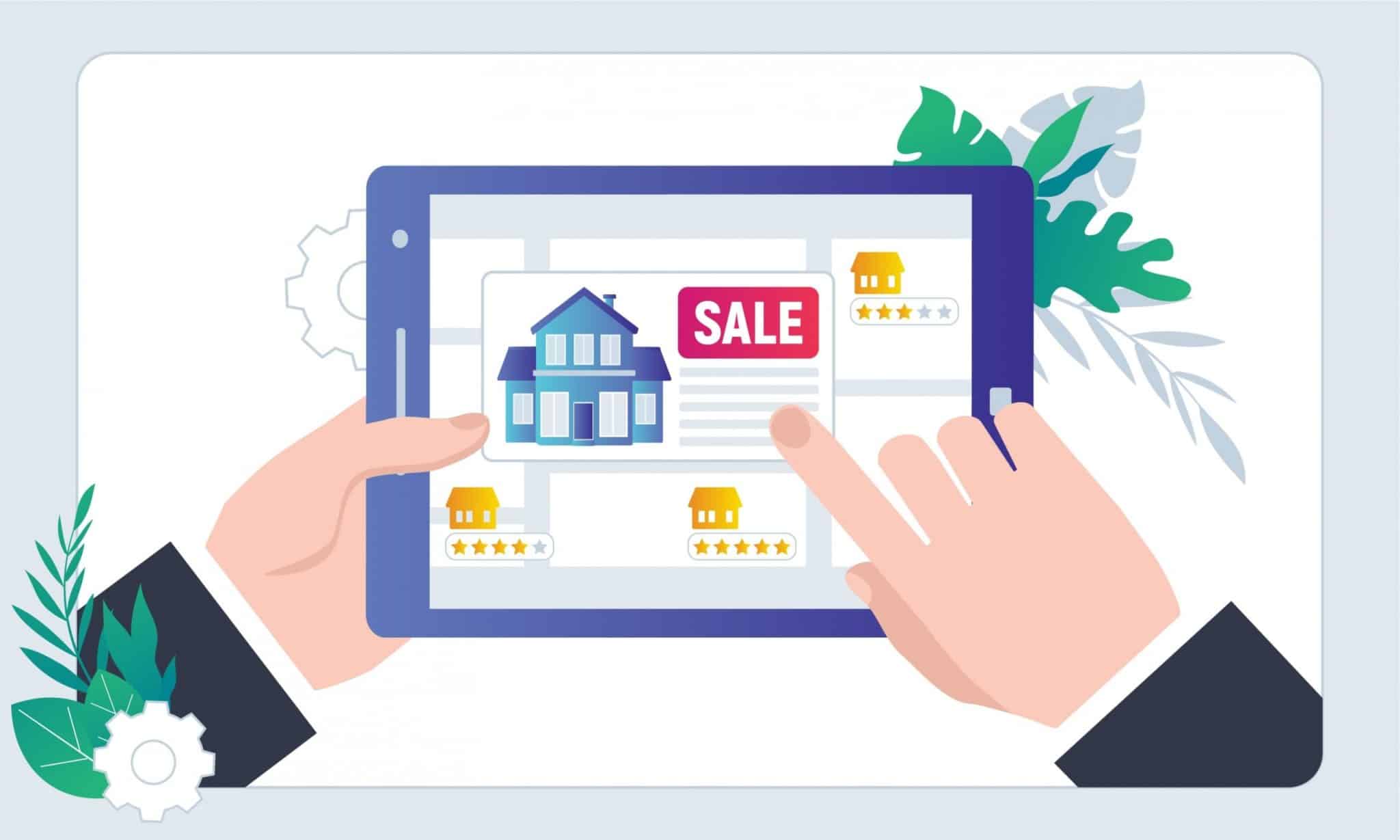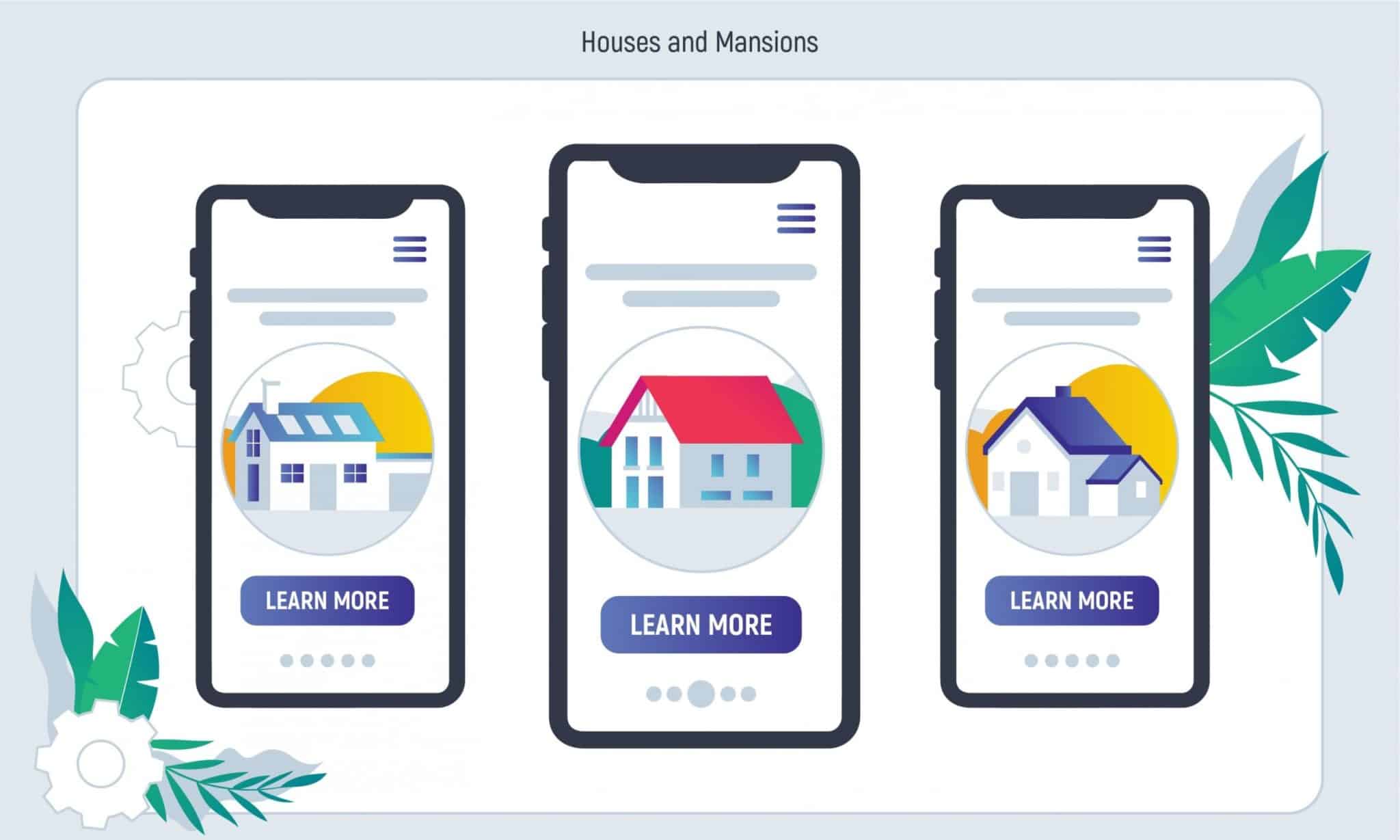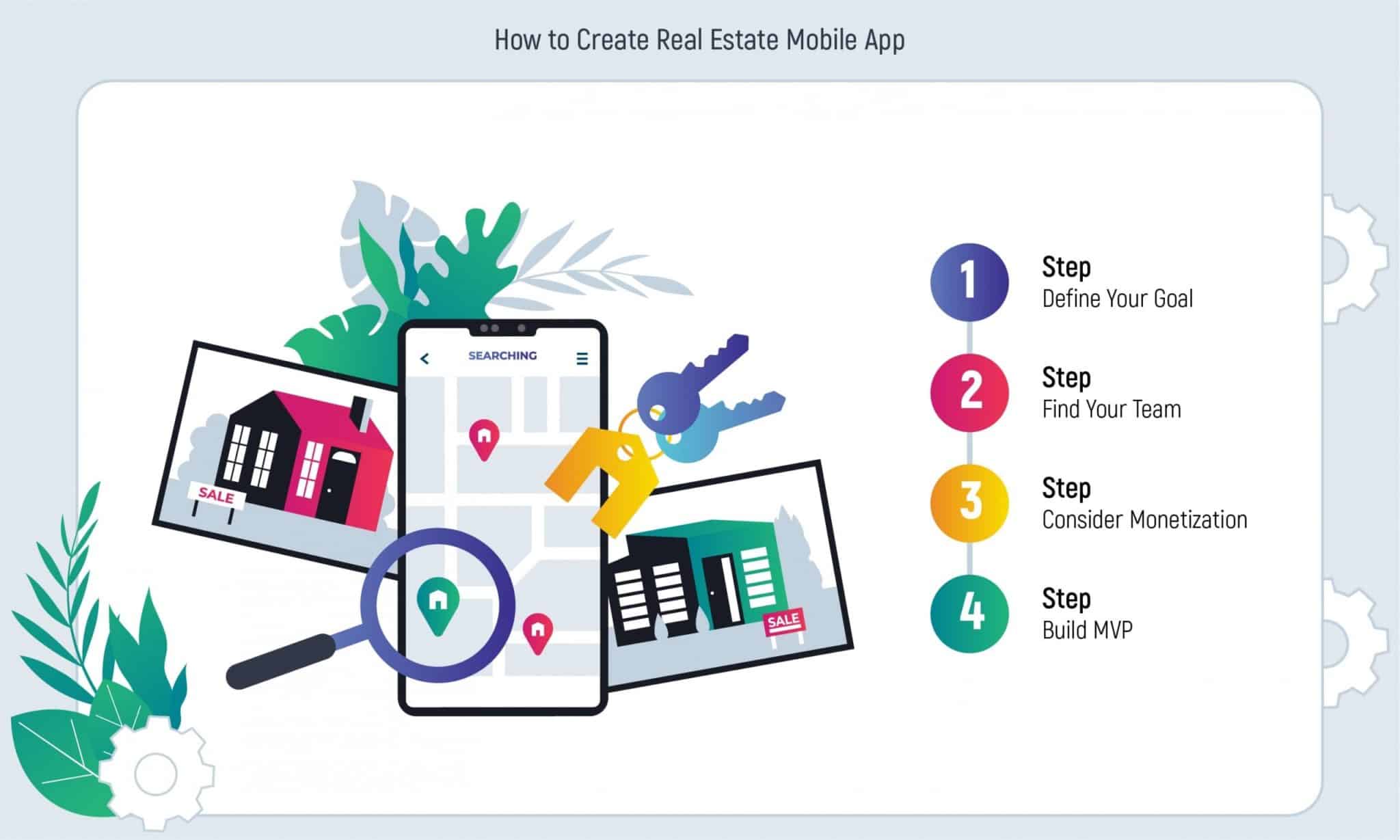Thinking of creating a real estate app but feeling overwhelmed? Learn how to build a successful real estate mobile app in 4 steps!
Uncover the necessity of mobile apps in the real estate market and learn the four crucial steps to create an exceptional app. Discover types of real estate apps, essential features, and follow a strategic development process for success.
Key Takeaways:
- Mobile App Significance: Understand the pivotal role of mobile apps in real estate, enhancing user engagement, and providing a remarkable experience.
- Types of Real Estate Apps: Explore Agency Apps and Aggregator Models, each serving unique purposes, offering sophisticated interfaces, and improving market positions.
- Noteworthy App Features: Delve into essential features such as personalization, property listing, detailed property profiles, integrated maps, and a property value calculator for a standout app.
- Development Steps: Follow a comprehensive four-step guide, including defining goals, assembling a competent team, considering monetization strategies, and building a Minimum Viable Product (MVP).
- Mobile App Development for Real Estate: What’s the Сatch?
- What Types of Mobile Apps are in Real Estate Industry?
- Agency App
- Aggregator Model
- Noteworthy Real Estate App Features
- Personalization
- Listing of proposition
- Property details
- Map
- Property value calculator
- Favorites folder
- 4 Core Steps for Developing a Real Estate Application
- Step #1: Define your goal
- Step #2: Find your team
- Step #3: Consider monetization
- Step #4: Build minimum viable product
- Final Thoughts
- Consider Inoxoft for Developing a Successful Mobile App Project
You may ask: “Do we really need mobile apps for real estate? There are various applications for, probably, everything that it seems irrelevant to make one for real estate, doesn’t it?” Frankly, it’s quite the opposite. Smartphones have become an integral part of our existence: DataReportal claims that the number of “unique” mobile users has already reached more than 5 billion!
In everyday life, we value features that help us save time and satisfy our needs in the most convenient way possible. Don’t we all sigh in relief seeing the “Available in mobile version” text on websites? Nevertheless, approximately 73% of real estate buyers found their homes using mobile devices. In this article, we will look at the phenomenon of real estate applications, how to build real estate mobile apps in just four steps and what features are crucial to include.
Mobile App Development for Real Estate: What’s the Сatch?
Mobile real estate app development brings nothing but positive effects. For instance, it helps increase users’ involvement in the accommodation searching (or selling) process: people can look up different apartments or houses using specific filters, such as location, price category, have a whole tour from inside thanks to VR technologies, and get in touch with agents straight from the app and all of this wherever they are located. People will get a remarkable experience choosing your real estate company or simply supporting your business if you provide a user-friendly mobile app based on the target audience’s needs and the latest trends in the application development technology market.
The necessity and, therefore, the profitability of the real estate market provides more opportunities for its enhancement and digitalization. And this leads us to the development of mobile applications! Nevertheless, the burning desire to start real estate app development is not enough. Initially, you have to examine the market. Who are your competitors? What do they provide within their applications? What monetization model to choose and how exactly can you win the hearts of your potential clients? This way, your offer will have a unique idea without repetition or failure. However, let’s summarize all the vital steps a little bit later and look at what the real estate app development industry can currently offer us.
What Types of Mobile Apps are in Real Estate Industry?
By stepping on the real estate mobile application development path, you should already have a vision of your future product, including its type, purpose and functions. And thanks to the variety of those on the market, everyone can choose one to their liking.
Agency App
Now that we know its importance, it’s apparent when a real estate company wants an additional upgrade to their website – a mobile app. New and regular customers can get to know the company through a sophisticated application. They also consist of easy communication tools, a pleasant interface and various features of property management software that satisfy every user’s needs.
On the other hand, the company can have another method of managing its position in the market: whether people use the app, how frequently they do it and what is lacking to increase engagement.
Aggregator Model
In this case, your application serves as a peculiar real estate marketplace – a mediator between agents, sellers, renters and buyers. All of them can register on the app and have specific accounts with different features. Users aiming to sell the property can upload all the needed information about it. They might add photos, location and price, on the platform. Users who want to buy it can discover the whole list of various items.
Thanks to Big Data, the app may suggest other options based on users’ previous preferences and views. People can communicate with each other and find their dream houses or dream customers. This type of mobile app development for real estate can be a genuinely profitable and successful investment for its developer.
Noteworthy Real Estate App Features
Once we have decided on our application type, we can continue the real estate app development journey. The next challenge is to choose vital features that would enrich the product and make it stand out from the other mobile applications. We picked up the list of essential real estate mobile app development features that deserve your attention.
Personalization
From the first click on the app icon, users want to get straight to business. Not everyone needs to go through the registration process in a heartbeat – some would appreciate having an opportunity to test the application first. Later, when users finish their onboarding process and are aware of all the features the app presents, they might want to sign up or log in with their social media/email accounts to have a complete and adequate user experience.
A personalized validated profile with the user’s basic information helps store their data and achieve their purpose based on its role. For example, a buyer’s account will have a different interface and features than a seller’s one. Considering your app type, people can bookmark items, rent, buy, sell, even leave feedback and communicate with other users.
Listing of proposition
Can you imagine a real estate app without a property’s database? Exactly. Listing is a must have feature in real estate apps since it provides all the information about your app offerings. The more listings, the happier users are. Hence, while building a real estate mobile app, it’s better to rely on services that can contain a vast database to escape any unfortunate situations.
You can get in touch with different broker organizations for providing multiple listing services (MLS) or even create your own. Also, you should decide on the procedure of the validation of offerings in case you want to allow users to upload their properties on the platform.
Property details
In the real estate industry, the availability of product representation in media files, in most cases, plays a crucial role in customers’ decisions. Such property profiles must provide a complete overview of the house or apartment. And, in addition, display high-quality photos and videos, price, location, neighborhood details and owner’s contact information.
Using VR technology to give customers in-depth tours through properties from their smartphones would be a massive breakthrough for the application. Plus, would be truly appreciated by end-users. This virtual tour allows people to have a real-time walkthrough of the house with an opportunity to look at every corner of it without a need to personally visit it!
Map
Can you imagine a real estate app without a built-in map? Probably impossible. Location is one of the most vital criteria in a housing search. Hence, this helpful feature allows one to observe a property’s placement from an aerial view. Users can examine their potential purchase’s neighborhood and get data about its surroundings, leisure facilities, infrastructure, transport system and other crucial information.
Property value calculator
This feature may make your real estate app developers sweat a bit, but it’s worth it. Cost estimation comes in handy while managing financial matters throughout the whole selling/buying process. Moreover, sellers can calculate the approximate value of their property to set the right price considering different factors. At the same time, buyers can use the feature to estimate the final sum. That includes initial payment, mortgage cost, taxes, loan interest and the repayment period.
Favorites folder
While browsing for the property of their dreams, people would prefer to mark those that they have interest in to avoid losing them. For that reason, a wish list creation feature is a crucial function for a convenient and lovely journey of app usage. Actually, it not only saves time for users to find potential houses but also allows sellers to see the number of bookmarks on properties which helps to examine which item enjoys popularity among customers the most.
4 Core Steps for Developing a Real Estate Application
Step #1: Define your goal
Ask yourself: Why do you need to build a real estate app? What value will the app bring to users and your business? Study the market and your competitors: look at their social media, app features, and customer feedback. Next, choose what the plan is precisely. Do you want to create a mobile version of your real estate firm or hotel website? Or, maybe, a good-old rental app or develop a platform for freelance agents to expand their network?
Don’t forget to make sure your proposition is unique. Furthermore, build something that would make the application stand out among the others, not another alternative to something already existing. Maybe, the advanced features that your competitors lack or some highlights that people will only associate with your app.
Step #2: Find your team
When it comes to custom mobile apps development it’s crucial to efficiently implement all the special features you planned. Plus, who can help, if it is not the group of professionals acquainted with the real estate technology industry? With the right team, there’s no need to worry about the final product’s quality and success. Together you’ll be able to choose the best way of managing the real estate app development process, such as deciding on the UI/UX design of the app and the implementation of all your ideas into code.
Step #3: Consider monetization
Making money from the application is a great benefit for its creators. In fact, there’s a wide range of monetization methods for different real estate apps. For instance, people (tenants, buyers or sellers) might pay commission fees for using the platform, see advertisements for real estate agents, lenders, interior designers, furniture stores, etc., and buy special subscriptions for more advanced features.
Step #4: Build minimum viable product
We won’t get tired of repeating the essentiality of MVP development while launching a brand-new product. Actually, it’s a terrific method to see the target audience’s reaction to the application and get their feedback and proposition. Hence, a minimum viable product will help you save time, money and prevent the development of bound to fail real estate apps.
Final Thoughts
In an era where smartphones have become indispensable companions in our daily lives, the real estate industry has not been left untouched by the wave of digital transformation. Mobile applications have emerged as powerful tools, revolutionizing the way people search for, buy, sell, or rent properties. Contrary to skepticism, the proliferation of real estate apps has proven to be not only relevant but essential in meeting the evolving needs of consumers.
The development of mobile apps for real estate brings forth a plethora of benefits, enhancing user engagement and streamlining the property search process. From personalized search filters to virtual property tours and seamless communication with agents, these apps offer convenience and efficiency like never before. By aligning with the preferences and behaviors of modern users, real estate companies can differentiate themselves and stay ahead of the competition.
When embarking on the journey of real estate app development, careful consideration of market dynamics, competitor analysis, and user preferences is essential. Whether opting for an agency app or an aggregator model, understanding the unique requirements of the target audience is paramount. Features such as personalized user profiles, comprehensive property listings, VR tours, interactive maps, and financial calculators are indispensable in delivering a superior user experience.
To embark on a successful real estate app development journey, a systematic approach is crucial. By defining clear goals, assembling the right team, considering monetization strategies, and building a minimum viable product (MVP), developers can pave the way for a successful launch. Through iterative development and user feedback, developers can refine their app and ensure it meets the needs and expectations of its intended audience.
In conclusion, the proliferation of mobile apps in the real estate industry represents a paradigm shift, unlocking new possibilities and opportunities for both consumers and businesses alike. By leveraging the latest technologies and adopting a customer-centric approach, real estate companies can position themselves for success in the digital age. With mobile apps serving as powerful tools in the hands of users, the future of real estate looks promising, with innovation and convenience at its core.
We suggest you take into account our tips on how to create real estate mobile app. Remember that sky’s the limit! Thus, don’t be afraid to try and give free vent to your ambitions.
Consider Inoxoft for Developing a Successful Mobile App Project
Do you remember the second step for developing a real estate application? The squad is one of the most vital keys to building successful projects, including real estate mobile apps. As a real estate development company, Inoxoft provides top-notch real estate development services for clients according to their goals and needs.
When you choose our company, you choose not only a dedicated team but also a flexible cooperation model, a robust and automated development process, and a successful final product. We guarantee to deliver the cutting-edge real estate application built by our team of certified engineers. Do not hesitate to contact us for extensive consultation on your project!
Frequently Asked Questions
How relevant are real estate apps?
Smartphones have become an integral part of our existence. And since approximately 73% of real estate buyers found their homes using mobile devices, the demand for real estate app development is ever growing!
How to create a custom real estate app?
- Define Your Goal. Choose what the plan is precisely: you want to create a mobile version of your real estate firm website, a good-old rental app or develop a platform for freelance agents to expand their network.
- Find Your Team. With the professional squad of real estate app developers, you'll be able to choose the best way of managing the real estate app development process.
- Consider Monetization. Making money from the application is a great benefit for its creators.
- Build Minimum Value Product. MVP will help you save time, money and prevent the development of bound to fail real estate apps.
- Believe in yourself. Seriously, you got this!
What are the best real estate rental mobile apps?
The most popular (and best) real estate apps are:
- Zillow
- Airbnb
- Trulia
- Apartment List
- Apartments.com
- *insert the name of your app* ;)
Also, get to know the most innovative real estate tech companies!













